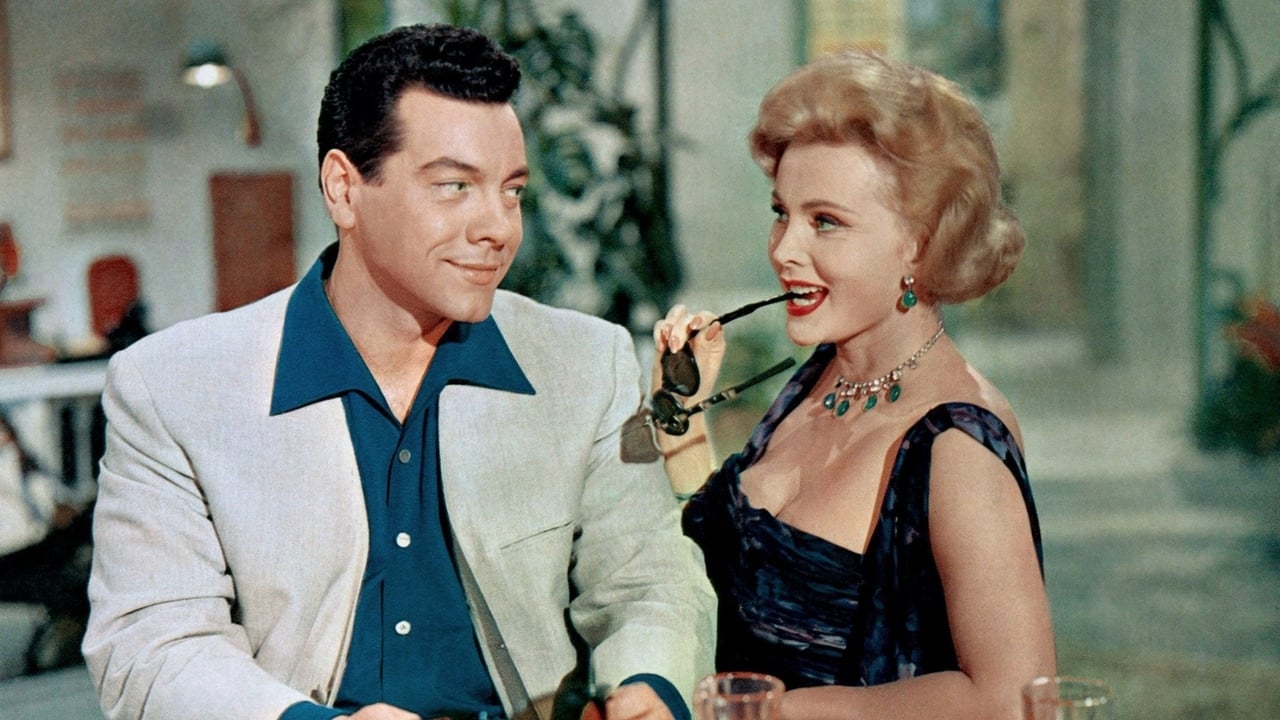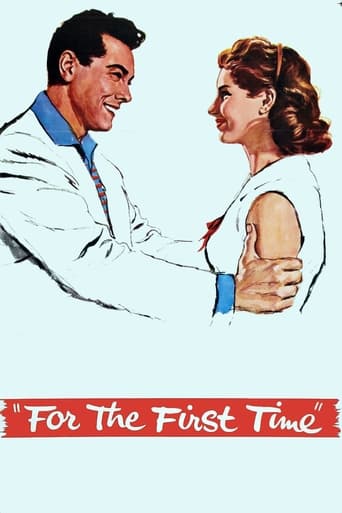



This movie is the proof that the world is becoming a sick and dumb place
View MoreAbsolutely amazing
It's the kind of movie you'll want to see a second time with someone who hasn't seen it yet, to remember what it was like to watch it for the first time.
View MoreIt is interesting even when nothing much happens, which is for most of its 3-hour running time. Read full review
View MoreMario Lanza sings and stars in his last film, "For the First Time," which has beautiful music sung against some of the most glorious scenery in the world on the Isle of Capri.Lanza plays opera star Tonio Costa who is seemingly always in trouble -- on the night of a concert, he doesn't show up and is found standing on a taxi singing for the people who couldn't get into the theater. He seems to have developed a bad reputation along the way. So his manager (Kurt Kasznar) sends him away for a vacation and to straighten himself out. He goes to Capri, and while there, he meets a young deaf woman (Johanna von Koczian). They fall in love, but she refuses to marry him until she can hear him.The story is sappy, but it's just an excuse for the music. Lanza's voice is much darker here, with the middle voice really opened up. As a singer myself, I will say this normally happens about 15 years after it happened to Lanza. With age, the vocal cords thicken. Many singers find new warmth and power in the middle, while the top notes become more difficult. I attribute these changes in Lanza to his drinking and hard lifestyle, which I suspect included smoking.At any rate, here he sings "Come Prima," "La Donna e mobile," "Vesti la giubba", the final scene of "Othello", the beginning of the Rigoletto quartet, a partial duet from Cosi fan Tutte, the Triumphant March from Aida, and Neopolitan and Bavarian songs. And with all that, I could have used more. As usual, the repertoire is strange - you don't give Cosi to a spinto tenore, and you don't give that role to one of Costa's supposed stature, nor should he have been singing Othello. Yes, singers can start out their careers with a lyric Mozart role, and as the voice develops, sing spinto roles - not a month later, but years later -- and possibly end their careers with an Othello, which is a dramatic tenor role, but again, not a month later.Lanza is bloated in many closeups and wears a suit jacket or a robe the entire movie, apparently to cover weight gain which isn't really that evident.How many young men did Mario Lanza inspire to take up operatic singing? How many people did he introduce to opera? One can only look at him here and say, what a waste. Since he was living in Rome, he was offered operatic stage roles. Imagine if he had lived to do them. One can only wonder why some gifted people are like fireworks, flaring up and then fading.The young woman in the movie, Johanna von Koczian, is "introduced" here and a superficial knowledge of movies is enough to tell you she didn't make it in Hollywood. However, she had, and is still having, a wonderful, full career in Germany. Her daughter is an actress as well.Highly recommended if you love opera and especially for Lanza fans.
View MoreSpoilerWhile watching this film I was struck by the fanciful idea that this is really about health care in Italy in the late 1950s. Here we see Mario Lanza raising money for a deaf girl's operation by performing in a stunning series of operas. I suppose a lucky patient would have to be an attractive, virginal girl like the one in this film. Then I recalled that Mario was often called upon in real life to raise money for charities in this way. I began to think this must have been how health care evolved in Italy. With Mario's untimely death- some claim by the Mafia because illness caused him to miss a concert he had promised to give-some other system had to replace him.The film itself is an excellent opportunity to witness Mario's rapturous tenor in a variety of roles -Canio,Radames,Otelo among others. The locations are gloriously picturesque. The copy I saw was actually dubbed in German which made it more interesting.
View MoreThe voice of Mario Lanza carries this nicely done film. The plot is a good one as a unreliable opera star finds love with a deaf mute girl.Lanza was also a pretty good actor.Zsa Zsa Gabor is in this one as a countess. She looks young but when she speaks, you think it's sister Eva talking from the "Green Acres" television show.Lanza sings a variety of songs. His singing of the opera Othello is superb. I have to confess that I laughed when I saw a "dead" Desdemona besides him. The latter looked like a younger version of former Secretary of State Madeleine Allbright.Our deaf mute gains her hearing only to lose it again with fiancée Mario blaming himself. The plot becomes silly when Mario begins a bar-room brawl and then the patrons of the bar try to exonerate him in court.Sit back and listen to that beautiful golden voice of the late Lanza. What a talent was lost when he left us so unexpectedly.
View MoreHe was really coming into his own in this film, it was released just before he died in 1959 at the tragically young age of 38, murdered (some say) by the Italian mafia, but most likely a heart attack, But anyway in this movie he could even sing a "calypso/rock n roll" in it with the "pineapple pickers" number, as well as his outstanding operatic music too, He was so truly good and believable in this his last movie, helped by a wonderful supporting cast including Kurt Kasner and Zsa Zsa Gabor that helped him with his role tremendously as Tony Costa, Mario was so handsome, a sexy man Yes, indeed Mario shines through this movie.His scene where he sings "Come Prima ("For the First Time") is a top moment indeed!, Aside from the movie's vocal strengths, what also helps save the film is the tender love story between Lanza and his delightful co-star, Johanna Von Koczian. Their flowering love for each other quickly though it develops, seems convincing and heartfelt, you believe they do love one another and without question...yes, Mario Lanza will live forever in this motion picture vehicle from the last year of the 1950's!
View More